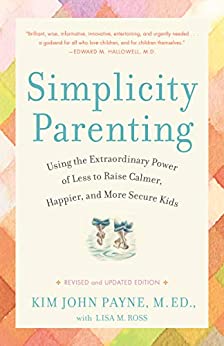More on this book
Community
Kindle Notes & Highlights
Read between
February 28 - April 1, 2025
David Elkind notes that children have lost more than twelve hours of free time a week in the past two decades.1
Inner alarms are sounded when we confront the huge disconnect between how we believe childhood should be and how it has become.
A protected childhood allows for the slow development of identity, well-being, and resiliency.
When we think back to our childhoods (as our children will to theirs), these small acts of noticing can form the emotional foundation of “home” or “family”: the place where we were “read,” understood, held in balance.
“When your child seems to deserve affection least, that’s when they need it most.”
Social skills can’t be stimulated by technology. In a world that increasingly relies on various forms of technology, none of which involve human touch, we find ourselves even further removed from one another.
Parents who talk, play, cuddle, and engage their babies, often and with pleasure, build a foundation of feelings that will prepare those small beings for widening circles of socialization, as toddlers and beyond.
Studies have shown that the more often families eat together, the more likely it is that kids will do well in school, eat fruits and vegetables, and build their vocabularies, and the less likely they will smoke, drink, do drugs, suffer from depression, struggle with asthma, or develop eating disorders.
They do it by never asking “Why?” Why do our kids need to be busy all of the time? Why does our son, at age twelve, need to explore the possibility of space travel?
There’s freedom in embracing the ordinary: freedom, and possibilities. Because in most things, the exceptional is not really what we want for them anyway. What we want for our children, truly, is engagement. We want their love of the cello to grow, to evolve and endure throughout their lives, whether or not they perform…whether or not they are ever exceptional cellists.
Until the age of six or seven, children are developmentally and psychologically unable to differentiate between reality and fantasy.26 So when they view brutal acts on television, they see them as “real.”
Giving our sons and daughters a strong sense of the true north of morally guided decisions, versus the magnetic north of constructed fad-driven popular culture, is one of the most valuable gifts of ethical discernment we as parents can give.
Too much information doesn’t “prepare” a child for a complicated world; it paralyzes them.
Children need to know that they have a place in a good world, full of promise.


